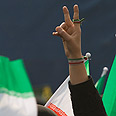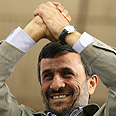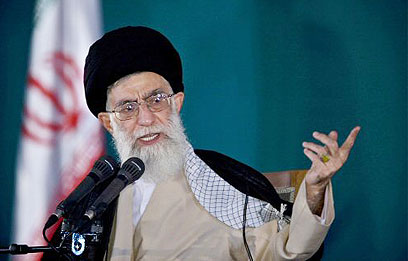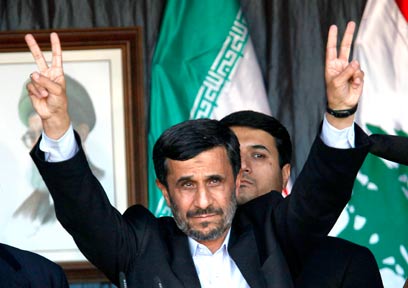

Iran's internal power struggles are shifting into election mode with hard-line political forces banding together to groom candidates for next year's parliamentary elections and punish allies of President Mahmoud Ahmadinejad.
Newly formed bloc of 15 ultraconservatives factions - united by absolute loyalty to Khamenei - marks powerful bid to expand control over political system before voting for Ahmadinejad's successor in mid-2013.
It's also a chance for more payback against Ahmadinejad for challenging the authority of Khamenei earlier this year, including boycotting Cabinet meetings in a dispute over the appointment of Iran's intelligence minister. Ahmadinejad is now viewed as a political outcast by many for overstepping the line - virtually assuring that the theocracy will block his backers from seeking the presidency when his second and final term expires.
"The upcoming elections in Iran are all about sending a message that even modest dissident is dead and loyalty to the system is what matters," said Sami Alfaraj, director of the Kuwait Center for Strategic Studies. "Iran's rulers want to project one strong face to the world."
For the West, meanwhile, this means coming to terms with the rebound of the ruling system that crushed the opposition after Ahmadinejad's disputed re-election in 2009.
Iran's policies appear firmly in the hands of its twin powers - the clerics and the Revolutionary Guard military-industrial giant - and election sweeps could bring even tougher stands on key issues such as the country's nuclear program and support for factions such as Hezbollah in Lebanon and Hamas in Gaza.
'The less power Ahmadinejad has, the less problems he can cause'
Parliament elections have traditionally been a "useful barometer to try and predict the outcome of upcoming presidential elections," said Meir Javedanfar, an analyst on Iranian affairs based in Israel.
It's expected, he said, that many pro-Ahmadinejad candidates for the March 2012 vote will be disqualified by the Guardian Council, a body that decides who can run in general elections. The possible big winners: former allies of Ahmadinejad who have turned against him.
"This is in line with (Khamenei's) idea that the less power Ahmadinejad has, the less problems he can cause," Javedanfar said.
Ahmadinejad already has paid a high price for pushing back against the ruling system.
Dozens of the president's allies have been detained over the past months - including four senior government officials - after Ahmadinejad resisted Khamenei's choice for the powerful intelligence minister post.
Hard-liners also have called for the arrest of Ahmadinejad's chief of staff, Esfandiar Rahim Mashaei, who has been denounced as the head of a "deviant current" that is perceived as questioning the system of clerical rule brought by the 1979 Islamic Revolution. Some have even claimed Mashaei used black magic "spells" to cloud Ahmadinejad's mind.
Ahmadinejad is significantly weakened, but still feisty. In late June, he railed against his opponents - and Khamenei by extension - for launching a "politically motivated" campaign and vowed to stand by Mashaei, whose daughter is married to the president's son.
The new network of Khamenei loyalists - called the Resistance Front and linked to powerful Islamic religious factions - is another bold swipe at Ahmadinejad.
The group's goals include crushing the ambitions of Mashaei or other Ahmadinejad insiders and showing unity to the West after the recent political infighting raised questions about Iran's political stability.
"We hate those who supported the (opposition movement) or those who remained silent and didn't support the leader (Khamenei)," said Ruhollah Hosseinian, a founding member of the Resistance Front. "We declare war with them."
The group also may act as political godfathers for potential presidential candidates such as Parliament Speaker Ali Larijani and Tehran Mayor Mohammad Bagher Qalibaf.
Under Iran's election system, the list of accepted candidates is not known until shortly before elections. But the opposition may simply opt out in advance.
Reformist leaders have strongly suggested they could boycott the parliamentary elections, which they fear could be rigged in favor of a hard-line landslide. There is also pressure to snub the elections in a show of solidarity with opposition leaders Mir Hossein Mousavi and Mahdi Karroubi, who have been silenced by authorities. Rights group claim they are being held in undisclosed locations - a charge denied by Iran.
"Reformists have not made a decision on whether to boycott the legislative elections," said Mohammad Javad Haqshenas, the former editor of the banned reformist newspaper, Etemad-e-Melli, that was owned by Karroubi.
- Follow Ynetnews on Facebook

















